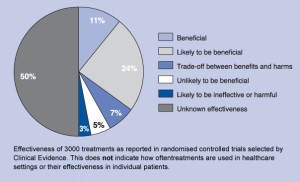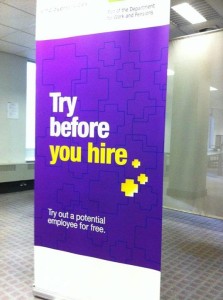Apparently, one of the most misused terms being hurled at What Doctors Don’t Tell You, as a rebuttal, is the term ‘science’.
We have been accused of being unscientific, of pedalling unproven and harmful alternatives, as opposed to the real thing, true ‘scientific’ medicine.
Says Lynne McTaggart. But instead of rebutting the accusations that the stuff contained in WDDTY is at best nonsense, and at worst dangerous, Lynne McTaggart goes on the attack and accuses conventional medicine of not being “remotely scientific”.
To prove her point, Lynne gives three examples of why science is not scientific…
1. Most of the science behind standard treatments is fiction. As leading members of the medical establishment have made clear in recent books, the so-called ‘proof’ of most so-called ‘proven remedies’ is data that has been invented or manipulated by drug company marketing teams.
2. Most treatments haven’t been proven to work. The British Medical Journal has concluded that only about 12 per cent of all medical treatments have adequate evidence demonstrating that they work.
3. Most treatments cause harm. Modern medicine is the third leading cause of death in the western world. Fact. Prescribed drugs and medical error kills 204,000 people every year in America alone, with only cancer and heart disease claiming more
I’m assuming reason one is a reference to Ben Goldacre and his Bad Science and Bad Pharma books. Not being within the Medical Establishment, I don’t know if he is a leading member of it or not. There is undoubtably manipulation of results by the pharmaceutical industry, it could be so much more transparent, with better publication of negative results and other stuff, but to call it all a fiction and for most medicines to not have any proof of er, proof of umm… efficacy? Science?
I’m gonna let Lynne have item number two, as I don’t have the figures to refute the ‘most’ at the beginning of that point. Thanks to a commenter on Lynnes’ post, we can see that there is more than 12% of all medical treatments can demonstrate they work. Lynne doesn’t link to anything to back up her claims. Make of that what you will.
What Lynne is referring to with the ‘12%’ is this. (We’ll not quibble over 1%, eh?)
So, 11% of treatments reported as having beneficial effects. There’s another category, Trade-offs Between Benefits and Harms, with 7%. This one has, if the title is anything to go by, also adequate evidence the treatment works, otherwise the category would be labeled “likely to be…”. These treatments may have side effects, but they are still have benefits. Not possible benefits, but actual benefits.
So that 19% of treatments that do work.
Now, lets explore this curious category of “Unlikely to be beneficial”.
‘Unknown effectiveness’ is perhaps a hard categorisation to explain. Included within it are many treatments that come under the description of complementary medicine
…
‘Unknown effectiveness’ may also simply reflect difficulties in conducting RCTs [Random Controlled Trials] of an intervention…
Considering the difficulties of getting homeopathy and other alternative medicines to consistently return positive results in RCTs then it’s not surprising that they are in the ‘unknown’ category. (Why they’re not in the more negative categories is a long story and not for this post). But if this is the medicine doctors’ won’t tell you vs the medicine doctors will tell you, then you need to take out of the soup of numbers all the alternative medicines and then see what percentage of treatments are beneficial, otherwise, it’s 11% of all treatments, not just the ones proven by the so-called scientific method, which is what Lynne is stating.
Moving on to number three, that most treatments cause harm, is completely unsubstantiated. Lynne states that modern medicine is the leading cause of death of death in the western world is a ridiculous claim. Adding “Fact” after it doesn’t make it one. Apparently the leading cause of death is ischemia and not ‘modern medicine’.
I’ve no idea where Lynne got her figures from for the amount of people killed in the USA by prescribed drugs and medical errors, but the next cause down after heart disease and cancer in America is strokes, with 129,476 deaths.
Next Lynne starts talking about data from the Alliance for Natural Health. Read their views on vaccines and make your own mind up. Reading their opinion on Wakefield and MMR should tell you all you need to know.
Let’s look at so-called ‘unscientific’ natural health care, which supposedly causes so much harm.
Yes, Lynne. Lets look at some more figures.
The risk of dying from taking any herbal remedy or food supplement is around 0.01 per one million people. In other words, 100 million people would have to take a supplement or herb before there is a risk of one person dying because of it.
Compare that to the risk of pharmaceutical drugs, which kill 1000 people for every million people taking them.
So that risk is: 0.01/1 million for natural substances vs 1000/1 million for drugs. In other words, the risk of lethal harm from modern medicine is 100,000 higher than that of herbal or nutritional medicine.
Firstly, Lynne seems to think that ‘herbal remedies’, ‘food supplements’ and ‘natural substances’ seem to be interchangeable. They’re not. Food supplements are different to herbal remedies and ‘natural substances’ is such a vague term it’s meaningless. But I digress. Those figures Lynne quotes are completely meaningless without pitting them against how many people had their condition improved. How many people took drugs and got better compared to how many took drugs and didn’t get better, with the same for alternative treatments. Then you’ll see a meaningful ratio for the effectiveness and risk of the various treatments. I’d be willing to bet, a higher proportion of people may have died from conventional medicine than Complimentary Alternative Medicine (CAM), but CAM would’ve successfully treated a much lower proportion, if any at all.
This beggars the basic question: which form of medicine is the least scientific?
Even with the capitalist manipulation of results from Big Pharma etc, you’ll find CAM is.
Lyne then waffles about science becoming rigid, and closed minded, in the usual way of someone fighting against the conspiracy of Big Pharma – Science has been captured by scientism, and so on.
In this post I have shown that Lynne uses the same techniques she accuses mainstream medicine of using to prove their case. When CAM can be explained, and shown to work using proper random controlled trials and not just anecdote, conjecture and made up words, then it will be taken seriously.
Until then, I’d rather listen to what my doctor does tell me than What Doctors Don’t Tell You tell me.



